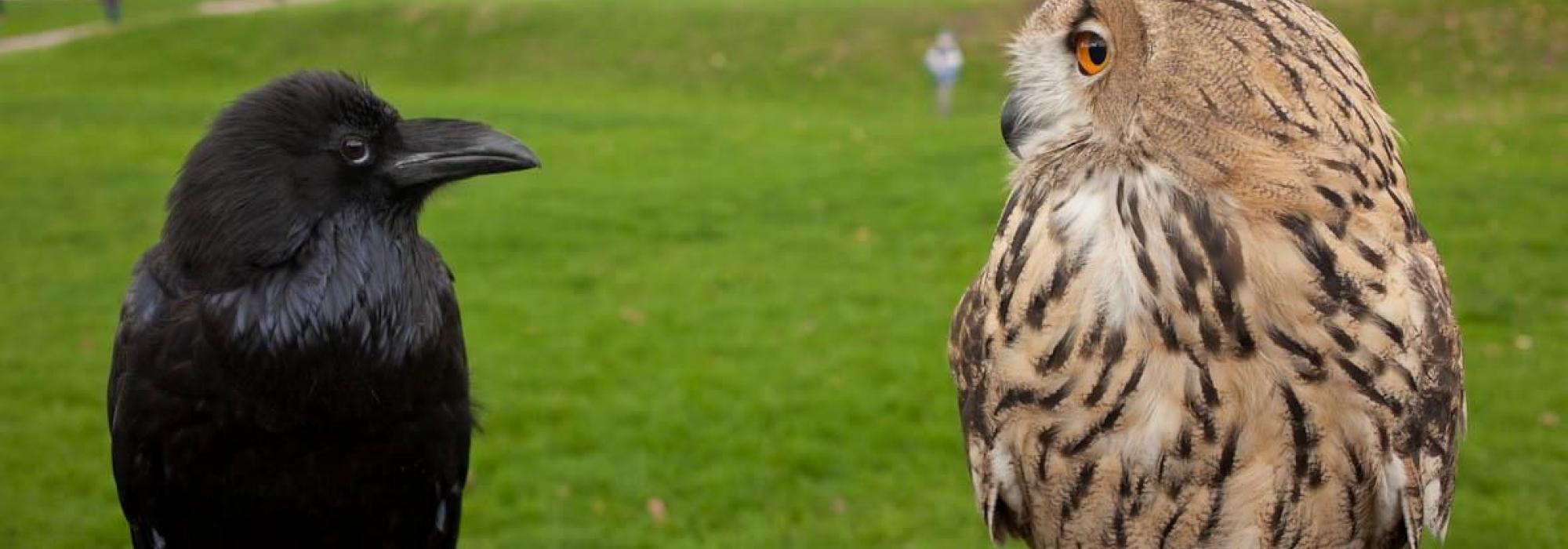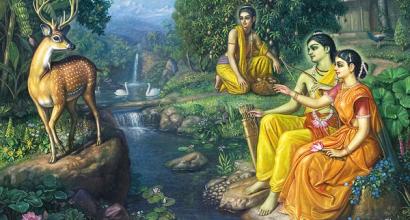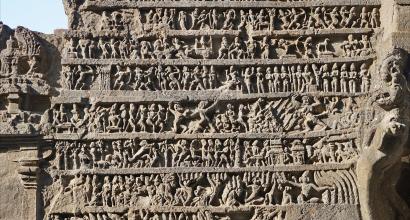In Pāṭalīputra lived two brāhmaṇas - Yajñasoma and Kīrtisoma. Among the two, the younger one, Kīrtisoma, flourished through the business he set up with the wealth he inherited. Yajñasoma, however, ate and drank and gave away generously whatever he had and eventually became a pauper. He couldn’t bear to be thus among his relatives and decided to migrate to a different kingdom. However, he couldn’t even muster money for the journey, even from his younger brother. Kīrtisoma did want to help his elder brother with some money out of affection, but his wife wouldn’t let him. Thus, Yajñasoma left his fate to God’s will and embarked upon his journey with his wife. On the way a huge snake coiled him and swallowed him whole. When his despondent wife wailed out loud, the snake asked her ‘Why do you despair thus?’ She replied in tears ‘I lost my vessel of alms! That’s why I cry’. The snake took pity and gave her a vessel of gold and said ‘Use this to seek alms!’ She then said, ‘Whoever will give alms to a woman’. Then the snake angrily cursed ‘May the heads of those who refuse you alms shatter into a hundred pieces!’ Then the wise woman quickly said ‘If that is so, then pray give me my husband in alms!’. Realizing that it had been outsmarted, the snake regurgitated her husband and went further and filled the golden vessel with precious stones. This encounter helped the snake shed its curse and transform back into its original form which was that of a vidyādhara king who then took their leave.
Yajnasoma lived happily thereafter.
~
A soldier once pleased the king with his valour. The king asked him – “What do you want?” and to everyone’s surprise, the solder replied – “Please lend me your barber”. Each measures the good and bad depending on his own mental framework.
~
In another instance, a person who was traveling in a cart asked the driver to repair the cart. The driver asked “What will you give me if I repair it?” The passenger said – “I will reward you with na-kāra!” The driver repaired the cart and said – “yes, now give me the na-kāra that you had promised!”
~
Naravāhanadatta slipped into sleep upon listening to these stories from Gomukha.
6. The following night, Gomukha narrated the following story to entertain the king
The Story of the Crows and Owls
Meghavarṇa was the king of crows that lived on a certain banyan tree. Its enemy, an owl by name Avamarda killed several crows at night. The next morning, the king crow asked the advice of the ministers for their security. They said as follows:
Uḍḍīvi: - If the enemy is strong, we should go away to another country, if not, we need to win him over through gentle means
Āḍīvi – Right now, there is nothing to be scared of; let us examine the intention of the enemy and our own strengths before acting.
Saṇḍīvi : When the enemy has wronged us, it is not right to abandon the country and flee. It is not right to surrender to him either. Death is better than the two. If we get the required help and fight with enthusiasm and bravery, we will certainly win.
Praḍīvi: When it is difficult to win over the strong, we will need to strike a sandhi – a peaceful understanding with him. When the circumstances provide, we can even eliminate him.
Cirañjīvi: What is a sandhi? Who will get it done? Crows and owls are enemies by birth! Who will go to strike a peace treaty? This is possible only through mantraalocanaa
Crow king – Aarya! You are old. Pray tell us why crows and owls have become eternal enemies of each other. You can then tell us about mantraalochana.
Cirañjīvī: It is faulty speech which has resulted in this animosity; Have you not heard the story of the donkey.
A washerman clad his donkey in a tiger’s skin and let it feed from others’ farms. One day, a farmer spotted it, mistook it for a tiger, covered himself in a blanket and was silently walking away with his back bent down in fear. The donkey took him for another donkey and brayed out loud. He caught this stupid donkey in the guise of a tiger and punished it to death. Thus, it was because of its own mouth that it passed away.
The same has happened to us too. In the past, as there was no king for the birds, owls decided that they should coronate the owl. A crow which was there said – “You fools! Don’t we have swan and cuckoos? Why are you making this inauspicious and wicked owl the king? The king should be powerful; even an utterance of his name must get the task completed.
Śilīmukha, the king of rabbits lived by a lake by name Candrasaras.
There, a tusker by name Caturdanta would come to drink water and would trample to death several rabbits. This happened time and again, so a rabbit named Vijaya declared that they had to think of some stratagem to avoid the widespread destruction. It caught the elephant unawares and spoke to it seated on a rock pillar: “I am the messenger of Candra, who has instructed thus: Candrasarovara is my residence. All the rabbits that live around it are my subjects. Therefore I am known as śītāṃśu and śaśī. You have destroyed this lake and killed my subjects. If you continue to do this, you will face appropriate retribution. This is the message Candra has given.” Listening to those words, the tusker was overcome with fright. It walked up to the lake where the moon was reflected and said, “Henceforth, I shall not do so!” It begged for forgiveness and bowed to Candra. It went away thus giving respite to the rabbits, which lived there fearlessly. In this manner, people should shudder upon merely listening to the name of the emperor. This being the case, what sort of a king will the blind and weak owl be! One should never trust the weak and helpless; I was atop a tree; at the foot of the tree, there lived a bird by name Kampijala. It had gone away somewhere. By the time it returned, a rabbit had come there. Both of them fought over the ownership of the nest. The two of them went seeking justice to a deceitful cat that was engaged in phony tapas. It said, “I don't hear too well; the rigorous tapas I have undertaken has made my body very weak.” Saying so, it called them both closer and with a swift strike, killed them both and gobbled them up. Thus, we don't want that wretched owl to be the king!” At that, the birds let go of their idea of coronating the owl. The enraged owl said, “Henceforth we shall be enemies,” and went away. Thus, the reason for our enmity is fault in speech. The owls are stronger than us and what's worse, they are greater in number. Greater numbers alone are sufficient to gain victory. Once a brāhmaṇa had purchased a goat and was taking it on his shoulders. A few miscreants who saw this hatched a plan to steal the goat from him. The first bloke went up to him and said, “What's this my man, why are you carrying a dog on your shoulders?” The brāhmaṇa paid no heed to those words. Then two others came up to him and posed the same question. Then, he got a bit suspicious. He checked once again if it was a goat or not. Three others then came up to him and said, “What's this, you seem to have made a dog into your yajñopavīta! You seem to be a hunter taking his dog for a hunt; you're definitely not a brāhmaṇa!” At that point, he thought to himself: some ghost or ghoul is playing tricks on me and I've become deluded. If not, will so many people lie? Then he left the goat on the ground, took a bath, and returned home. The miscreants promptly took the goat away and ate it with great relish. Therefore, let us not oppose the strong and mighty; I shall tell you a strategy; pluck away a few of my feathers, throw me at the foot of this tree, and go away to that hillock. I will finish the task and join you.
They acted accordingly. When the owls returned that night, Cirañjīvi alone was lying on the ground in a hapless state. When asked the reason for his pitiable condition, he said, “I am the minister of the crow-king; I advised him not to oppose the mighty ones and proposed that we live in peace. Accusing me of having joined hands with the enemy, they struck me down and went away somewhere.” The owl asked his ministers what had to be done with this crow. They advised thus:
Dīptanayana:- Even though someone is a thief not worth saving, but if he is helpful, good people will save him; an old merchant had married a young woman who was rich; she always avoided him; she would turn her back towards him while sleeping; one night a thief entered their house and frightened by his appearance the young woman finally turned towards her husband and embraced him; surprised he looked around for the reason and saw the thief. He could have caught him with the help of his attendants; but seeing that his appearance was favourable to him he forgave him. Likewise we should save Cirañjīvī since he has been beneficial to us.
Vakranāsa:- Since he knows all the secrets of the enemy he is worth saving; if there is enmity between the rival king and his minister it is favourable to us; Listen to this story which I shall narrate:- A brāhmaṇa had an ox. One night a thief entered his house in a bid to steal it. At the same time a rākṣasa too arrived planning to eat the brāhmaṇa. They both quarrelled saying, ‘I’ll get the ox first’ ‘No I’ll eat the brāhmaṇa first!’ The brāhmaṇa’s sleep was disturbed. He woke up and came with a sword reciting the rakṣoghna mantra (mantra used specifically to kill rākṣasas). Both the thief and the rākṣasa had to flee! Thus this rivalry is certainly beneficial to us.
Prākārakarṇa:- Cirañjīvī has surrendered being in trouble; so he is worthy of compassion; didn’t the great king Śibi offer his own flesh instead of the surrendered pigeon?
Raktākṣa:- O king! The counsel you have got from all these ministers is wrong; you should never trust enemies; in spite of seeing the folly if one keeps quiet it is foolishness. So an enemy is never to be saved.
The owl-king didn’t agree. “He seems to be good; he has come to be favourable to us; he is also in a pitiable condition; alone; what harm can he do?” Cirañjīvī said, “O king of owls! What’s the use of living like this? Give me some firewood, I’ll pray to the Yajñeśvara to grant me the life of an owl in my next birth and immolate myself; that way I can give a fitting response to the king of crows at least in my next life!” Raktākṣa laughed and said, “Our king is pleased with you, why do you worry about immolation now? Being a crow now you can’t turn into an owl; once created by Brahma one would remain the same. Long time ago, a ṛśi found a mouse; a vulture had accidently dropped it while flying; feeling pity he turned it into a girl by the powers of his tapas; the girl grew up to be a youth, he decided to give her hand in marriage to a strong man and he called the Sun and asked him, ‘Marry my daughter!’ He said, ‘The cloud is stronger; he covers me in a second!’ The cloud said, ‘The wind is stronger; in a second he disperses me in all directions!’ The wind in turn said, ‘The mountain is stronger; I can’t even shake it!’
The mountain said ‘The humble mouse is more powerful than me. It can even burrow through me!’. Thus, after mulling over the words of the gods and the wise, the sage summoned a mouse and commanded it: ‘Do marry this daughter of mine!’. The mouse asked ‘But, O mighty sage, how will she ever fit into my burrow?’. The sage then thought ‘Perhaps I should turn her back into a mouse - that would be fitting!’, and uttered magical incantations and transformed his adopted daughter back into a mouse and married her off. Thus no matter how far people go, their core stays the same! So I know very well that you will never turn into an owl”. Listening to this, Cirajīvi thought ‘This owl Raktākṣa is a master strategist. Thankfully the owl-king Avamarda did not agree with him. Now my mission is as good as accomplished!’ and became jubilant.
Within a short span of time, under the protection of the owls, Cirajīvi gathered more feathers and grew as healthy as a fine peacock. One day it said to the owl king, ‘The time is ripe. I shall bring that crow king Meghavarṇa here. You all should lay in wait until he’s here. Then ambush him swiftly and slay him. It may be a bad idea for you owls to take them on in broad daylight. It is better if you stay hidden in your nests. I will cover your burrows with grass, ferns and leaves so that you remain unseen!’ and thus convinced him and did exactly as was planned. Cirajīvi then flew in the crows, each of which held a flaming torch between its beaks. Led by Meghavarṇa, the crows swooped down and cast their burning torches upon the dry blades of grass which thickly covered the owls’ burrows. The foliage instantly caught fire and the heat and the smoke began to burn, smother and choke the owls inside. They couldn’t see anything and were all soon charred to death. Then Cirajīvi said aloud: ‘Raktākṣa was Avamarda’s best minister. Since the owl king didn’t listen to his advice, I managed to outwit them like the snake did the stupid frogs:-
Once lived a snake which had become too old to catch frogs. Seeing it lying seemingly helpless near the shore of a stream, the curious frogs cried from afar ‘O snake, why are you not devouring us like earlier?’. Then the snake replied wistfully: ‘Once I was chasing down a frog, and in the confusion that ensued, my fangs stuck the big toe of the son of a brāhmaṇa. The boy died. Then his furious father cursed me: ‘May you be ridden by frogs!’. That being so, how could I ever come to eat you kind folk? It’s my curse to dutifully bear you all on my back and ferry you around!’. Listening to these words, the king of frogs was delighted and was overcome with the desire to ride upon the snake’s back. He slowly came forward and climbed on to its back. The snake made the frog-king and its ministers happy by carrying them around. As time passed, one day it said ‘My king! I cannot carry you around on an empty stomach now, can I? Wouldn’t you be so kind as to arrange some food for me? Doesn’t your humble and loyal servant need feeding?’. Then the foolish frog-king agreed and replied: ‘Alright. I permit you to eat a few of my companions!’. The snake began to gleefully gobble as many frogs as it wanted. Thus a clever individual can easily outsmart fools. I too did the same!”.
Stories of fools (continued)
Narrating this story, Gomukha said ‘Thus, using the abilities of their minds, even lowly creatures find joy and happiness. And they who lack intellect, are subjected to ridicule by others. Long ago, two brāhmaṇa brothers split up equally, the wealth they inherited from their father, in deference to his wishes. They had but only one servant. So they even split her in two and shared the remains! Needless to say, they were handed out severe punishment by the king of the land!
Discontent too leads to disaster, as this next story illustrates. Long ago, there lived some wandering mendicants who filled their stomachs with food obtained from alms. They were, however, quite hale and hearty. Looking at them, some people were surprised that they were so well endowed physically, despite living on alms. One among them vowed ‘Just watch, my friends. I’ll make them thin!’. One day he invited them to his home and treated them to a royal repast. Once they had savored such a sumptuous meal, they began to find the food from alms to be not to their liking. That day on, they could never satiate themselves on alms and soon became emaciated.
The current article is a translation of Prof. A R Krishnasastri’s Kannada classic Kathāmṛta along with additional segments added from the original Kathā-sarit-sāgara (of Soma-deva). Bṛhat-kathā-mañjarī (of Kṣemendra) and Bṛhat-kathā-śloka-saṃgraha (of Budha-svāmin) have also been referred to. The translation has been rendered by Raghavendra GS, Arjun Bharadwaj, Srishan Thirumalai, and Hari Ravikumar.
The original Kannada version of Kathāmṛta is available for free online reading. So are the other works of Prof. Krishna Shastri















































